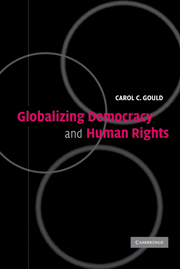Book contents
- Frontmatter
- Contents
- Acknowledgments
- Introduction: Between the Personal and the Global
- PART I THEORETICAL CONSIDERATIONS
- 1 Hard Questions in Democratic Theory: When Justice and Democracy Conflict
- 2 Two Concepts of Universality and the Problem of Cultural Relativism
- PART II DEMOCRACY AND RIGHTS, PERSONALIZED AND PLURALIZED
- PART III GLOBALIZING DEMOCRACY IN A HUMAN RIGHTS FRAMEWORK
- PART IV CURRENT APPLICATIONS
- Index
1 - Hard Questions in Democratic Theory: When Justice and Democracy Conflict
Published online by Cambridge University Press: 23 November 2009
- Frontmatter
- Contents
- Acknowledgments
- Introduction: Between the Personal and the Global
- PART I THEORETICAL CONSIDERATIONS
- 1 Hard Questions in Democratic Theory: When Justice and Democracy Conflict
- 2 Two Concepts of Universality and the Problem of Cultural Relativism
- PART II DEMOCRACY AND RIGHTS, PERSONALIZED AND PLURALIZED
- PART III GLOBALIZING DEMOCRACY IN A HUMAN RIGHTS FRAMEWORK
- PART IV CURRENT APPLICATIONS
- Index
Summary
I want to begin by considering some hard questions in the theory of democracy that center on this issue: When is it legitimate to constrain democratic decision making in the interest of justice? If democracy is a central value in political and social life, what can justify limiting or overriding the decisions arrived at by the democratic process? Wouldn't any constraint undercut the very essence of democracy? On the other hand, justice is also a central value for politics, economics, and society. Can our commitment to democratic process allow for decisions or laws democratically arrived at that violate the requirements of justice? Where these two values conflict, what is the basis for judgment as to which will prevail? Even if we agree that in certain cases democracy should be constrained in the interest of justice, who has the right or the authority to determine this? Worse yet, if democracy is itself understood as that procedure that most fully realizes the principle of justice (by recognizing equal rights of participation in decision making), how can it in turn need to be constrained by the requirements of justice? In short, how can democracy as a just procedure itself violate justice?
Liberal theorists, most notably John Rawls and Robert Dahl, have discussed these issues principally in the context of political democracy. The primary constraint on democratic decision making has typically been seen as a constitutional framework that sets the boundaries of legitimacy for democratic decisions by protecting the rights or basic liberties of individuals and by specifying, limiting, and balancing the powers of government.
- Type
- Chapter
- Information
- Globalizing Democracy and Human Rights , pp. 13 - 49Publisher: Cambridge University PressPrint publication year: 2004



